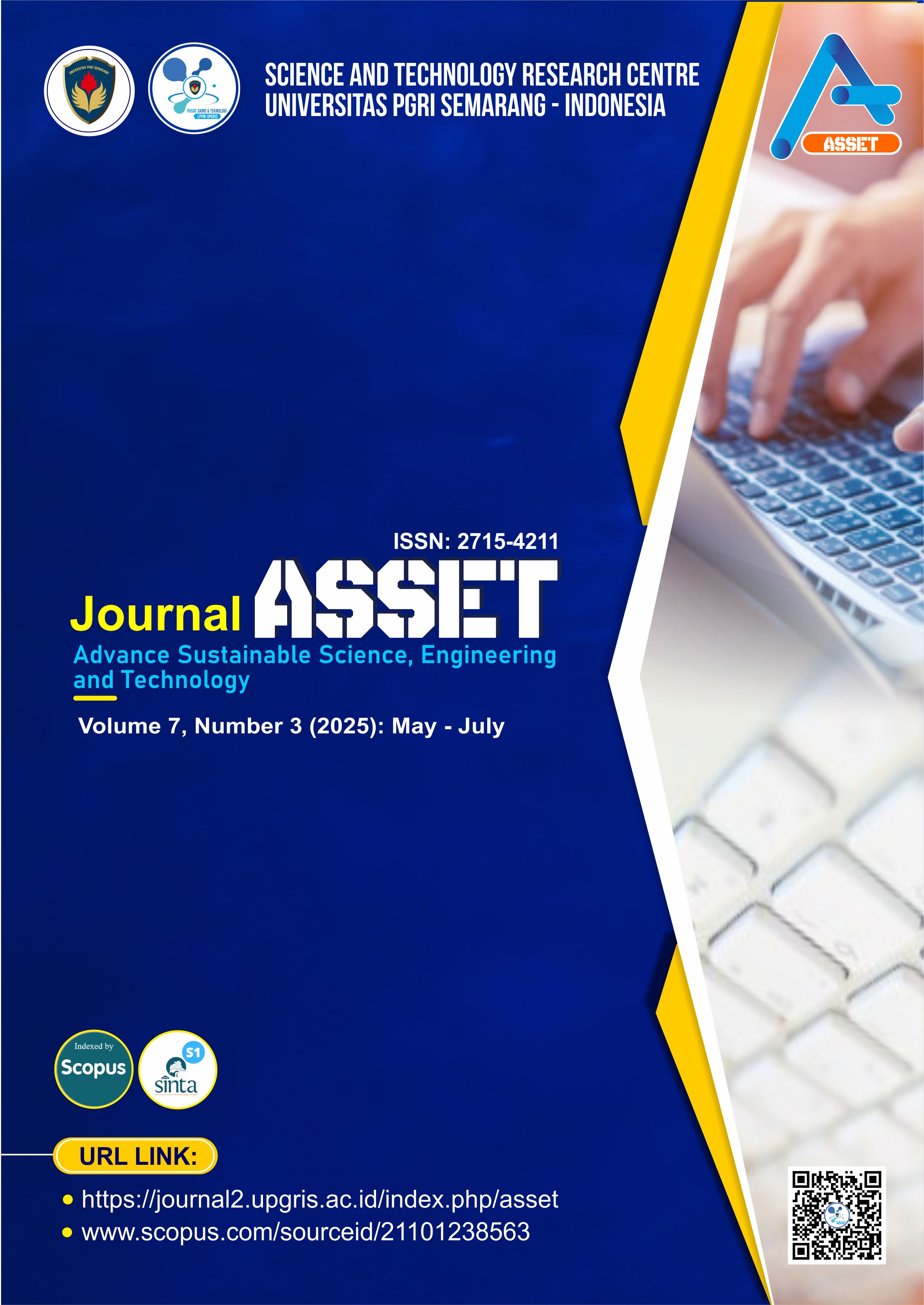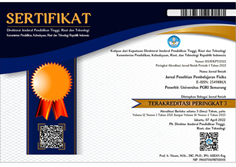Assensing the Impact of Advanced Driver Assistance Systems (ADAS) on Road Safety an Empirical Study Using Factor Analysis
DOI:
https://doi.org/10.26877/asset.v7i4.2371Keywords:
ADAS, factor analysis, industry 4.0, road safety, sensor integrationAbstract
Road traffic accidents remain a critical global concern, especially in low- and middle-income countries. Advanced Driver Assistance Systems (ADAS) are introduced as proactive safety technologies in the industry 4.0 era. This study aims to assess the impact of ADAS on road safety through an empirical approach. A quantitative survey involving 260 licensed drivers was conducted, followed by qualitative interviews to provide contextual insights. The dataset was confirmed reliable (KMO = 0.82; Cronbach’s α = 0.87), and factor analysis identified four latent constructs: Collision Avoidance, Driver Behavior and Acceptance, System Reliability, and Road Safety Impact, explaining 68.5% of variance. Results indicate that collision avoidance and system reliability are the strongest predictors of user trust, while road safety impact emerges as an independent factor emphasizing societal benefits. The findings highlight that ADAS adoption should be framed not only as technological acceptance but also as a contribution to sustainable mobility and SDG 3.
References
[1] Kim H-T, Mineev A, Ricci D, - al, Sivakumaran V, Joshi HC, et al. Development of Advanced Driver Assistance Systems for Indian Cars. IOP Conference Series: Materials Science and Engineering 2020;912:062030. https://doi.org/10.1088/1757-899X/912/6/062030.
[2] Narkhede MM, Chopade NB. Review of Advanced Driver Assistance Systems and Their Applications for Collision Avoidance in Urban Driving Scenario. Lecture Notes in Networks and Systems 2022;256:253–67. https://doi.org/10.1007/978-3-030-82469-3_23.
[3] Ahmed SK, Mohammed MG, Abdulqadir SO, El-Kader RGA, El-Shall NA, Chandran D, et al. Road traffic accidental injuries and deaths: A neglected global health issue. Health Science Reports 2023;6. https://doi.org/10.1002/HSR2.1240.
[4] Lu M, Wevers K, Van der Heijden R. Technical Feasibility of Advanced Driver Assistance Systems (ADAS) for Road Traffic Safety. Transportation Planning and Technology 2005;28:167–87. https://doi.org/10.1080/03081060500120282.
[5] Masello L, Castignani G, Sheehan B, Murphy F, McDonnell K. On the road safety benefits of advanced driver assistance systems in different driving contexts. Transportation Research Interdisciplinary Perspectives 2022;15:100670. https://doi.org/10.1016/J.TRIP.2022.100670.
[6] Aleksa M, Schaub A, Erdelean I, Wittmann S, Soteropoulos A, Fürdös A. Impact analysis of Advanced Driver Assistance Systems (ADAS) regarding road safety – computing reduction potentials. European Transport Research Review 2024;16:1–13. https://doi.org/10.1186/S12544-024-00654-0/FIGURES/4.
[7] Nitin, Sati B, Mehta A. Advanced Driver Assistance System (ADAS). International Journal of Advanced Research in Science, Communication and Technology 2024;4:506–12. https://doi.org/10.48175/ijarsct-17582.
[8] Tanu BJ, Ahmed MdS, Islam MdA, Ferdosi BJ. A Comparative Study of Recent Practices and Technologies in Advanced Driver Assistance System. International Journal of Computer Applications 2024;186:54–66. https://doi.org/10.5120/ijca2024923796.
[9] Jiménez F, Naranjo JE, Anaya JJ, García F, Ponz A, Armingol JM. Advanced Driver Assistance System for Road Environments to Improve Safety and Efficiency. Transportation Research Procedia 2016;14:2245–54. https://doi.org/10.1016/J.TRPRO.2016.05.240.
[10] Yang K, Al Haddad C, Alam R, Brijs T, Antoniou C. Adaptive Intervention Algorithms for Advanced Driver Assistance Systems. Safety 2024, Vol 10, Page 10 2024;10:10. https://doi.org/10.3390/SAFETY10010010.
[11] Gheorghe D. The Need of Advanced Driver-Assistance System’s Development based on an Analysis of Road Accidents. Informatica Economica 2023;27:17–28. https://doi.org/10.24818/issn14531305/27.3.2023.02.
[12] Yang E, Yi O. Enhancing Road Safety: Deep Learning-Based Intelligent Driver Drowsiness Detection for Advanced Driver-Assistance Systems. Electronics 2024, Vol 13, Page 708 2024;13:708. https://doi.org/10.3390/ELECTRONICS13040708.
[13] Saetren GB, Vaag JR, Saghafian M, Wigum JP, Helde R. Teaching advanced technology (ADAS) and use of touch screens in driver training in Norway. Cognition, Technology and Work 2024;26:523–34. https://doi.org/10.1007/S10111-024-00766-6/TABLES/5.
[14] Krishnan VG, Rao PV, Navaneethakrishnan M, Prabhu V, Parkavi D, Tamilarasan T. Improvement of Safety in Road Environment by Designing an Advanced Driver Assistance System. International Conference on Automation, Computing and Renewable Systems, ICACRS 2022 - Proceedings 2022:907–11. https://doi.org/10.1109/ICACRS55517.2022.10029157.
[15] Neumann T. Analysis of Advanced Driver-Assistance Systems for Safe and Comfortable Driving of Motor Vehicles. Sensors 2024, Vol 24, Page 6223 2024;24:6223. https://doi.org/10.3390/S24196223.
[16] Cheni VK. The Evolution and Impact of Advanced Driver-Assistance Systems. International Journal on Science and Technology 2025;16:1–13. https://doi.org/10.71097/ijsat.v16.i1.2915.
[17] Gouribhatla R, Pulugurtha SS. Drivers’ behavior when driving vehicles with or without advanced driver assistance systems: A driver simulator-based study. Transportation Research Interdisciplinary Perspectives 2022;13:100545. https://doi.org/10.1016/J.TRIP.2022.100545.
[18] Masello L, Sheehan B, Castignani G, Shannon D, Murphy F. On the impact of advanced driver assistance systems on driving distraction and risky behaviour: An empirical analysis of irish commercial drivers. Accident Analysis & Prevention 2023;183:106969. https://doi.org/10.1016/J.AAP.2023.106969.
[19] Amoruso M, Caiola S, Doronzo G, Difino M. Sensor Fusion for Advanced Driver Assistance Systems. Advanced Computing and Communications 2017. https://doi.org/10.34048/2017.2.F4.
[20] Sule SY, Bitrus E, Solomon Y. The Impact of Advanced Driver-Assistance Systems (ADAS) on Road Safety in Nigeria. Asian Journal of Science, Technology, Engineering, and Art 2024;2:784–95. https://doi.org/10.58578/AJSTEA.V2I5.3880.
[21] Huang C, He D, Wen X, Yan S. Beyond adaptive cruise control and lane centering control: drivers’ mental model of and trust in emerging ADAS technologies. Frontiers in Psychology 2023;14:1236062. https://doi.org/10.3389/FPSYG.2023.1236062/BIBTEX.
[22] Muslim H, Itoh M. Long-Term Evaluation of Drivers’ Behavioral Adaptation to an Adaptive Collision Avoidance System. Human Factors 2020;63:1295. https://doi.org/10.1177/0018720820926092.
[23] Huang C, Wang J, Yan S, He D. Exploring Factors Related to Drivers’ Mental Model of and Trust in Advanced Driver Assistance Systems Using an ABN-Based Mixed Approach. IEEE Transactions on Human-Machine Systems 2024;54:646–57. https://doi.org/10.1109/THMS.2024.3436876.
[24] Musau H, Gyimah NK, Mwakalonge J, Comert G, Siuhi S. Analyzing Factors Influencing Driver Willingness to Accept Advanced Driver Assistance Systems 2025.
[25] Biassoni F, Gnerre M. Understanding Elderly Drivers’ Perception of Advanced Driver Assistance Systems: A Systematic Review of Perceived Risks, Trust, Ease of Use, and Usefulness. Geriatrics 2024, Vol 9, Page 144 2024;9:144. https://doi.org/10.3390/GERIATRICS9060144.
[26] Zahabi M, Razak AMA, Mehta RK, Manser M. Effect of advanced driver-assistance system trainings on driver workload, knowledge, and trust. Transportation Research Part F: Traffic Psychology and Behaviour 2021;76:309–20. https://doi.org/10.1016/J.TRF.2020.12.003.
[27] Neuhuber N, Pretto P, Kubicek B. Interaction strategies with advanced driver assistance systems. Transportation Research Part F: Traffic Psychology and Behaviour 2022;88:223–35. https://doi.org/10.1016/J.TRF.2022.05.013.
[28] Deguzman CA, Donmez B. Factors Influencing Trust in Advanced Driver Assistance Systems for Current Users. Proceedings of the Human Factors and Ergonomics Society Annual Meeting 2023;67:1403–4. https://doi.org/10.1177/21695067231192903.
[29] DeGuzman CA, Donmez B. Propensity to trust technology and subjective, but not objective, knowledge predict trust in advanced driver assistance systems. Transportation Research Part F: Traffic Psychology and Behaviour 2024;107:726–43. https://doi.org/10.1016/J.TRF.2024.09.025.
[30] Hansen A, Kiely K, Attuquayefio T, Hosking D, Regan M, Eramudugolla R, et al. Assessment of the application of technology acceptance measures to older drivers’ acceptance of advanced driver-assistance systems. Applied Ergonomics 2025;125:104474. https://doi.org/10.1016/J.APERGO.2025.104474.











